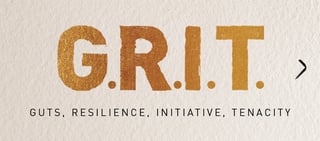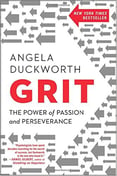 As you move into the end of a semester, the pressure of exams can daunt even the most successful students. It’s a busy time of year in general, and the mounting strain of a large looming test can feel outright agonizing! Fear not. Here is a list of go-to tips to help you be your most prepared and confident self going into those final exams (or any tests, at any time!)
As you move into the end of a semester, the pressure of exams can daunt even the most successful students. It’s a busy time of year in general, and the mounting strain of a large looming test can feel outright agonizing! Fear not. Here is a list of go-to tips to help you be your most prepared and confident self going into those final exams (or any tests, at any time!)
Improving Academic PerfORMANCE
Learn how to improve yourself through targeted learning and improved study skills.
Posts about grit:
Getting 'Gritty' With It
 Failure ain’t what it used to be. Or, at least, failure is understood differently today, as we examine more closely how much it actually helps us in the long run. When we allow failure and setbacks to be learning experiences and jumping off points for the development of resilience and grit, our lives transform. We refine our character all the more, but like a fine work of art that benefits from revision and reframing. Nowhere is such an experience in growth more valuable and applicable than education.
Failure ain’t what it used to be. Or, at least, failure is understood differently today, as we examine more closely how much it actually helps us in the long run. When we allow failure and setbacks to be learning experiences and jumping off points for the development of resilience and grit, our lives transform. We refine our character all the more, but like a fine work of art that benefits from revision and reframing. Nowhere is such an experience in growth more valuable and applicable than education.
An Introduction to Grit: A Key to Academic Performance
 Over the past five years, I’ve done a fair amount of secondary research (reading articles, books, etc.) on academic performance. Two of the most interesting and actionable discoveries I’ve made are that A) a student’s mindset is far more important in explaining academic success than I would have imagined and B) a concept called Grit is what seems to power the performance of a student with the right mindset.
Over the past five years, I’ve done a fair amount of secondary research (reading articles, books, etc.) on academic performance. Two of the most interesting and actionable discoveries I’ve made are that A) a student’s mindset is far more important in explaining academic success than I would have imagined and B) a concept called Grit is what seems to power the performance of a student with the right mindset.
The “Growth Mindset” is a concept invented by Dr. Carol Dweck, a Standford Psychologist. Her research shows that individuals can generally be placed into one of two buckets: a) those that have a growth mindset and b) those that have a fixed mindset.
Effort vs. Talent? Which has a greater impact on academic success? Part One
 Anybody that reads this blog knows that we like to write about how mindset, effort, deliberate practice, proper study habits, organization and time management skills, strategic planning (and many other concepts that have more to do with “what you do” than “what you are born with”) are critical drivers of academic success. And, importantly, they are firmly under the control of any student. In our view, these concepts as a group easily trump IQ or talent when it comes to explaining success in and outside of school.
Anybody that reads this blog knows that we like to write about how mindset, effort, deliberate practice, proper study habits, organization and time management skills, strategic planning (and many other concepts that have more to do with “what you do” than “what you are born with”) are critical drivers of academic success. And, importantly, they are firmly under the control of any student. In our view, these concepts as a group easily trump IQ or talent when it comes to explaining success in and outside of school.
At the same time, we know that genes do matter. IQ is a metric that does help explain academic and other types of performance, and it is, for example, correlated with performance on standardized tests (even though I must stress again, hard work and structured practice will help you improve dramatically on standardized tests whatever your starting point).
So, is there a framework that can be used to think about the relationship between effort and talent in explaining academic and other types success? Which is more important?
It's a tough question, but while listening to a recent episode of the Psychology Podcast hosted by Dr. Scott Barry Kaufman, I think I may have found an answer.
Keys to Success: Beyond Hard Work and Intelligence
 If you ask a random collection of people what is needed to be successful in school, you’ll probably receive quite a few responses along the lines of “hard work” or “a high IQ.”
If you ask a random collection of people what is needed to be successful in school, you’ll probably receive quite a few responses along the lines of “hard work” or “a high IQ.”
I would never suggest that one shouldn’t work hard, or shouldn’t always try to continually build their intelligence. But I think there’s mounting research and evidence that hard work and intelligence really aren’t the fundamental drivers of academic, professional, interpersonal/social, athletic, or artistic success.
Before introducing four more fundamental keys to success, let’s briefly discuss why hard work and intelligence don’t really lead to success, and might even lead to failure.
